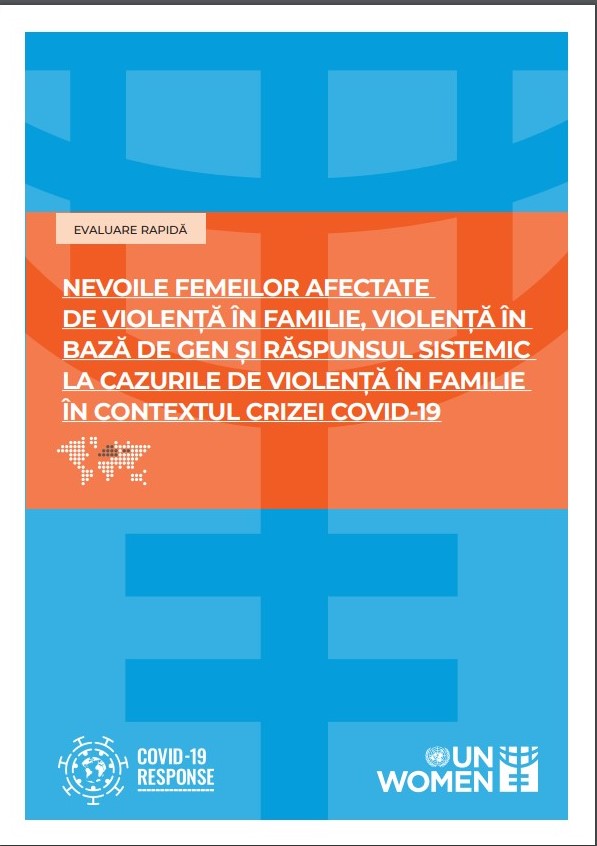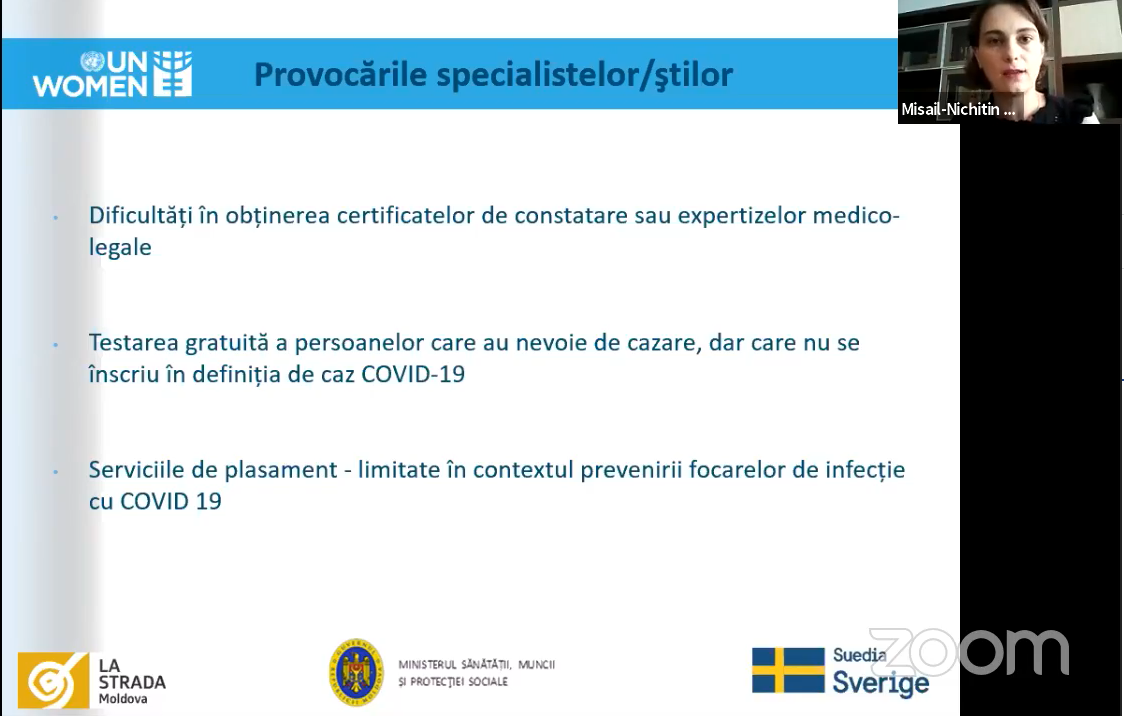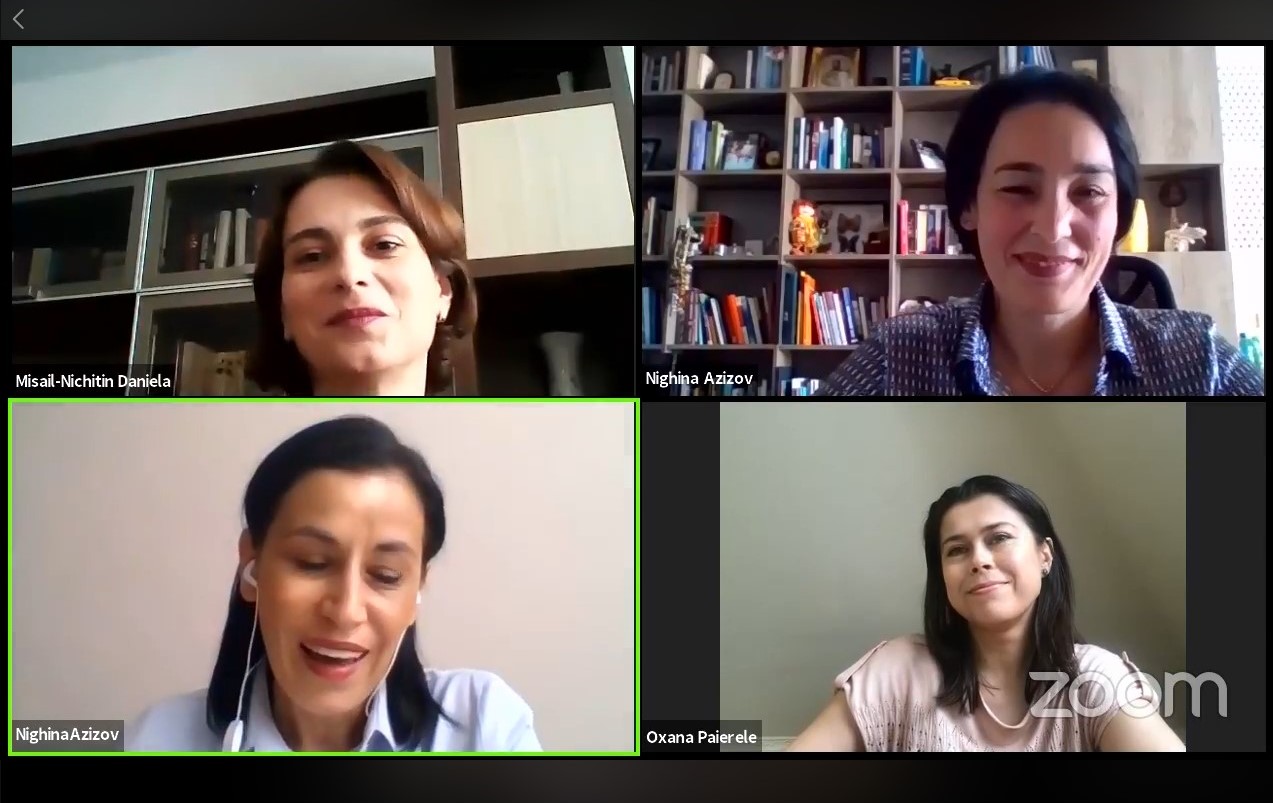The results of the rapid assessment "The needs of women affected by domestic or gender-based violence and the systemic response to cases of domestic violence in the context of the COVID-19 crisis" were presented
The restrictive measures imposed in relation to the COVID 19 pandemic contributed to the increase in the number of cases of violence against women, and many shelters have had to close their doors for safety reasons. In this context, the lack of resources and means of communicating to report cases of violence and to access essential assistance services, but also the continuous presence of the aggressors, have contributed to the vulnerability of women- and children-victims of domestic violence and gender based violence.
In the context of these circumstances, in the period May-June 2020, UN Women Moldova in collaboration with International Centre La Strada Moldova, the Ministry of Health, Labour and Social Protection, with the financial support of Sweden, carried out a rapid assessment aiming to understand the impact of the crisis on the women affected by domestic violence, to analyze the challenges of the systemic response to cases of domestic violence and to identify possible systemic changes that are necessary in order to be able to deal with crisis situations. The results of this rapid evaluation were presented and discussed during an online press-club on the 7th of August 2020.

55 interviews were carried out as part of the rapid assessment, with the participation of women affected by domestic violence, specialists from the member organization ‘Life without violence’, persons responsible for intervening in situations of domestic violence and representatives from the justice system and the Forensic Medicine Centre.
According to the results of the assessment, it was found that women from urban areas are more vulnerable to violence during the state of emergency (64% and 80% of calls to specialized organizations). In the majority of cases, the women are mothers with 1-3 children, they are aged between 25 and 45 (less over the age of 60) and have secondary education (80%).
Among the main needs of the women affected by domestic violence are basic necessities and other financial needs, the need to find shelter, but also the access to medical assistance services, psychological counselling and legal assistance. Also because of the restrictive measures imposed by the pandemic, women are facing a significant reduction in their buying power, an increase of pressure related to the closing of kindergartens and the remote learning process, but also the limited access to services and authorities and protection measures against COVID-19.
At the same time, the system of assistance and protection of victims of domestic violence was put into the position of dealing with a double challenge – to continue to ensure the needs of the persons affected by violence, while also respecting the measures of prevention of the infection spread. Thus, multiple organizations have had to revise their working regime, adjust the services they provide, some even suspending their activity in order to prevent the development of outbreak hotspots.
‘Even from the beginning of the pandemic, the most receptive, flexible and willing to mobilize for the cause of the beneficiaries, was the community of service providers. Although they didn’t come up with the most sustainable solutions, they knew how to prioritize the urgent needs of women. They re-organized their regime and working tools and even identified additional financial resources for the cases when the women and children had to be removed immediately from the violent environment. The authorities are still rigid in managing this unprecedented crisis.’ said Daniela Misail-Nichitin, director of the Issues Affecting Women Program, La Strada Moldova.

‘The frustration related to the risk of getting ill, the economic losses, the uncertainty, the home isolation and other restrictions imposed by the pandemic increase the risk of domestic violence. At the same time, the services of prevention and protection of victims of gender-based violence are less available, either as a result of the change in the working regime, the lack of information about the new ways of accessing the services, the restricted travel or the constant control the abusers have over their partners during the pandemic.’ mentioned Dominika Stojanoska, UN Women Representative to Moldova.

Oxana Paierele, program coordinator within the Swedish Embassy in the Republic of Moldova, declared that: ‘During the last months, we noticed a good cooperation between the partners of the Embassy of Sweden and the relevant actors, with the goal of obtaining positive results to continue the functionality and accessibility of services. For certain, these services can’t be discontinued, because the experience from the last few months showed that the pandemic makes no difference between genders. It affected all social groups, but it especially hit vulnerable persons, and maybe, to some respect, it intensified this discrepancy”.
The report brings some recommendations that were identified during the assessment, they have the goal of improving the systemic response to the needs of the victims of domestic violence and their children. Among the main recommendations are the following: ensuring individual protection measures for institutions; providing appropriate technical equipment to the centers for victims of domestic violence, ensuring the availability and diversification of services focused on the victim’s needs, diversifying accommodation services (social apartments, crisis housing etc.), extending and diversifying the economic empowerment programs for women affected by domestic violence and others.
A series of recommendations regarding the modification of the normative framework, which could be helpful for the professionals in the field, was also identified during the rapid assessment.
‘This study will help us understand the phenomenon of violence and the real needs of the victims who are facing a double challenge: domestic violence and the pandemic.’ said Lilia Pascal, chief of theDirection for Policies ensuring equality between women and men of the Ministry of Health, Labour and Social Protection.
